While in New York working on a trio of award shows last month, I took full advantage of my time in the city by squeezing in theater whenever I could. That means at the end of a 12-hour work day, I’d rush out to see an off-Broadway play I’d purchased last-minute discounted tickets to. Totally worth being bleary-eyed the next day. I saw mostly off-Broadway plays, which — by my account — is the best bang-for-your-buck in terms of original storytelling and pushing the boundaries of theater. But I also attended some high-quality revivals of Broadway classics (Fiddler on the Roof, She Loves Me) and an important transfer from London (Tennessee Williams’ Streetcar Named Desire).

Most of these shows have already closed or will close soon, but since NYC is the breeding ground for new theatrical works, I suspect they will pop up elsewhere regionally in the coming months or years.
Without further ado…
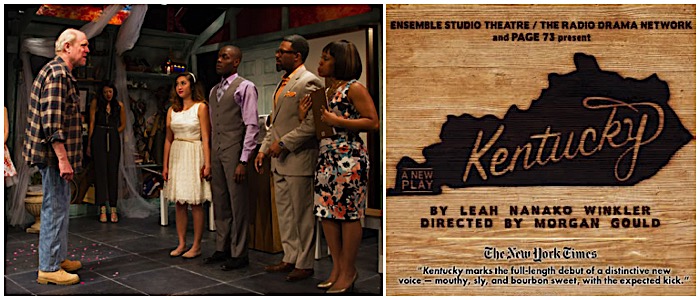
Kentucky by Leah Nanako Winkler (off-Broadway)
The Maxamoo Theater Podcast often influences my decision to see new work by playwrights I haven’t heard of, in venues I haven’t previously visited — and their recommendations typically lead to a thought-provoking and engaging night at the theater. Kentucky is the perfect example of this: Leah Nanako Winkler is an emerging voice in theater, and minutes into this play-with-music I was invested in her characters and their obstacles. Hiro is our abrasive protagonist — she escaped her family years ago by moving to NYC to work her way up in the marketing field, but now she must return to her Kentucky hometown to stop her little sister from getting married. Hiro contends with her abusive father, a hillbilly who drinks too much and wields negativity like a sword; her subordinate mother, a quietly optimistic Japanese woman who has suffered under her husband’s behavior for far too long; and her sister, a born-again Christian who regularly professes that “Jesus is awesome!” and that marriage is all she wants, despite Hiro’s efforts to broaden her horizons in regards to career and geography. Hiro reconnects with a high school crush and several of her former best friends (all of whom have remained firmly planted in their hometown). All of these interactions prove more stressful than Hiro anticipated, but luckily she has her NYC therapist on speed-dial and anxiety meds to keep things in check. Leah Nanako Winkler plays with form in unique ways: we are treated to brief musical interludes, confessional monologues delivered via direct address, and a human playing a cat. Kentucky is at turns hilarious and devastating. The cast is outstanding, very much up to the task of playing such high-intensity scenes. Kudos to director Morgan Gould for staging this large ensemble piece in such an intimate space. This show has since closed, but it is deserving of another run in New York.
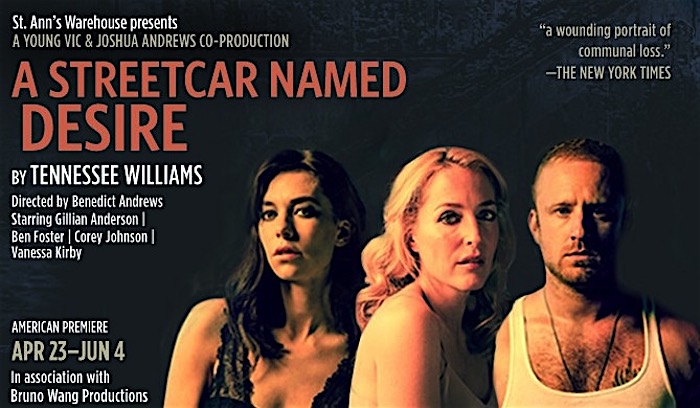
A Streetcar Named Desire by Tennessee Williams (off-Broadway)
Can you believe I’d never seen this Tennessee Williams classic before? I knew that someday I’d catch a top-tier revival, and when I got word that this critically acclaimed production from the Young Vic in London was transferring to St. Ann’s Warehouse in Brooklyn, I knew I had to score a ticket. I splurged on a $90 front-row seat and it proved a great investment — director Benedict Andrews has staged this Streetcar in the round, on a constantly-revolving turntable, so the action shifted right in front of me. Gillian Anderson stars as the fragile Blanche DuBois, an aging southern belle whose world is spinning out of control (literally, thanks to the turntable). Blanche shows up unannounced at her sister Stella’s apartment in New Orleans, which Stella shares with her husband Stanley (played with much intensity by Ben Foster). Stanley is immediately suspicious of Blanche, who has lost the family estate in Mississippi but refuses to provide any details about how that happened. A school teacher on a “temporary” leave of absence, Blanche is desperate to cling to her youth and secure a husband before she gets any older, but throughout the play her checkered past catches up with her. Over the ensuing months, Blanche, Stella, and Stanley’s lives intertwine and unravel to disastrous degrees, and Williams’ meaty material provides great acting moments for these serious thespians. One thing caught me off guard: there is a lot of misogyny and violence against women in this play. The abuse is verbal, physical, and sexual in nature, and that was a little hard to take for the three-hour running time. Regardless, I’m glad to have finally encountered this classic, as interpreted by actors of this caliber.
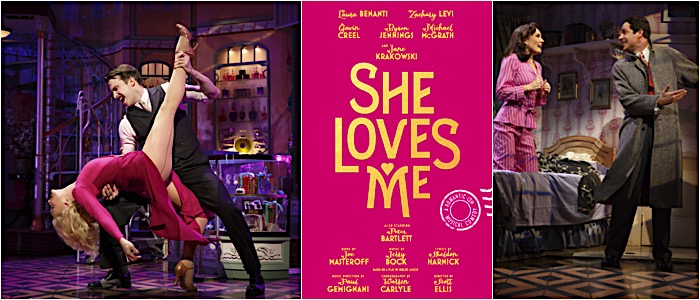
She Loves Me by Joe Masteroff, Jerry Bock & Sheldon Harnick (Broadway)
This delightful gem of an old-school musical is shining again on Broadway. It’s an adaptation of the play Parfumerie by Hungarian playright Miklos Laszlo, which is perhaps best-known as the inspiration for the 1998 Tom Hanks / Meg Ryan film You’ve Got Mail. As such, the plot of She Loves Me will sound familiar: Georg and Amalia are co-workers at a parfumerie in Budapest. They do not get along. But each has started a letter-writing romance through a Lonely Hearts club, and little do they know they are writing to each other. When Georg realizes that his “dear friend” (as they address each other in the letters) is Amalia, he is shocked, and spends nearly all of Act 2 hiding the truth while continuing to write to her. They warm up to each other at work, and soon Amalia realizes she has feelings for Georg but doesn’t know what do do about her pen pal romance. Just before the show’s finale, Georg reveals he is her “dear friend,” and they finally end up together. The end.
The cast of this revival is quite starry — Laura Benanti and Zachary Levi play Amalia and Georg, while Jane Krakowski and Gavin Creel play co-workers at the parfumerie in an on-again, off-again romance. All four are terrific. (Laura Benanti was out sick at the performance I attended, but luckily I got to watch her sing her glorious number “Vanilla Ice Cream” many times during Tony Awards rehearsals.)
A few dramaturgical glitches stand out to me. For a show that appears so light-hearted, an Act 1 on-stage suicide attempt by the owner of the parfumerie (in response to news that his wife is cheating on him with a notoriously playboy employee) feels way too heavy for this show — I’m surprised they didn’t lower the stakes there because for a bit it feels like we’re watching a totally different musical. The other issue I have is that Georg keeps the truth from Amalia for so long that he ends up gaslighting her, which is fairly unacceptable behavior and hinders the degree to which I care about this couple ending up together. Yes, they have chemistry, but Georg is a jerk for making up fake details about Amalia’s “dear friend” (that he’s fat, bald, etc.) — at first it works for comedy’s sake, but he does this for nearly all of Act 2 and that costs him points with this theatergoer.
Also worth noting: She Loves Me is the first Broadway show to stream live — for around $10, you can watch it from the comfort of your own home.
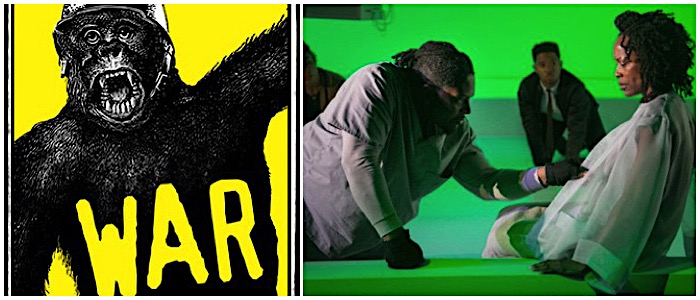
War by Branden Jacobs-Jenkins (off-Broadway)
Branden Jacob-Jenkins is a young and critically-acclaimed playwright — he was a finalist for the Pulitzer this year for Gloria, a show that knocked me over when I saw it last summer. War, currently in its final weeks at Lincoln Center, does not have the same effect, but it still gets major points for wrestling with a lot of big ideas. Jacob-Jenkins covers so much ground in this show — what is identity? How is it tied to our family? To our race? Are there obligations within the context of our identity, and should we feel pressure to live up to them? What about obligations to family members? Each of these questions could occupy its own play, and by splitting focus to grapple with all of them, War lacks a certain direction. But it stayed with me and I found myself mulling over parts of the show in the days after I saw it. Here’s a spoiler-free plot synopsis: the play centers around the family of a middle-aged black woman named Roberta, lying comatose in the hospital after suffering from a stroke. Her son and daughter rush to her bedside and find a strange woman speaking a language they don’t understand. Turns out she is German, and her adult son is also in the picture. Everyone is connected and the rest of the play is spent processing this new information and deciding how to move forward. We switch back and forth between reality (the hospital room) and Roberta’s subconscious as she struggles to remember who she is via extensive conversations with a gorilla. (That explains the promotional materials for this play.) There are a lot of ideas jumbled up into War, and it’s mostly compelling, despite that it lacks the necessary cohesiveness to be a truly outstanding play. Regardless, Branden Jacobs-Jenkins operates on a level most playwrights wish they could reach, and I will always be curious to see his work.
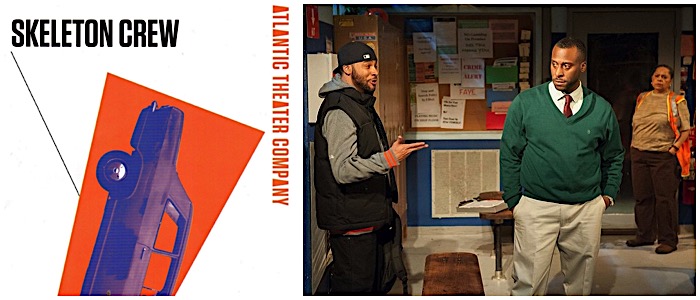
Skeleton Crew by Dominique Morisseau (off-Broadway)
If you see one show on this list, let it be this one. (Skeleton Crew has since closed but I suspect it will have more life, at least regionally if not in New York.) Playwright Dominique Morisseau has crafted an extremely moving account of the individuals at a plant in Detroit that is on the verge of shutting down. As the title suggests, these are the bare bones employees needed to keep the place running. All of the action takes place in the plant’s break room. Economically, these characters are all living on the margin: either just eeking by, or already struggling with homelessness. Skeleton Crew stands out to me in large part because it deals so engagingly with the issue of class — it reminds me of another stellar play I saw earlier this year, Martyna Majok’s Ironbound at Rattlestick. While Ironbound examines class through the lens of its Eastern European immigrant protagonist, Skeleton Crew views such struggles through Detroit natives desperate to hang onto their jobs just a few months longer. Dez is a restless 20-something eager to move on from his position at the plant to something more in line with his auto shop dreams — he has goals and is eager to pursue them, even though it means packing heat to avoid scuffles on his way to work every morning. Shanita is a peppy pregnant employee who takes pride in the work she does; she resists Dez’s romantic advances and doesn’t hesitate to put him in his place — or anyone else who dares borrow her salad dressing from the break room fridge without permission. Faye is a nearly-retired lesbian who has spent three decades working at the plant and is now the union rep; if she’s laid off in the next few months she’ll lose her retirement package. Faye’s deceased partner’s son, Reggie, now runs their department and struggles to find a balance between doing right by his employees and also appeasing higher management, who could rip away his family’s contented suburban life if they fired him. The stakes are high for everyone, and as an audience member it does not take long to feel personally invested in the outcome of this plant’s future. If only every night at the theater were this engaging, moving, and satisfying.
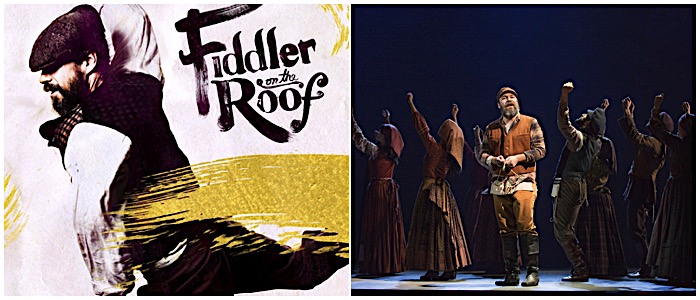
Fiddler on the Roof by Joseph Stein, Jerry Bock & Sheldon Harnick (Broadway)
I was 20 years old when I saw the 2004 Fiddler revival starring Alfred Molina, and at the time I did not connect with it. My youth, lack of real-world experience, and the fact that my rush seat was located all the way at the back of the Minskoff kept me from fully engaging with the story. But this 2016 revival under the auspices of director Bartlett Sher convinced me to give Fiddler another chance, and I’m so glad I did — the power of this classic moved me to tears. Danny Burstein’s performance as Tevye is instantly lovable, and alternates between hilarious and heartbreaking. The music is so strong; practically all of the numbers are classics. Despite clocking in at nearly three hours, the show feels trim and spare — each song, each moment, feels necessary. While I’m sure anyone reading this is already familiar with the plot, the Cliffs Notes version is that a poor Jewish milkman named Tevye is raising five daughters with his wife, and he attempts to maintain his Jewish cultural traditions despite changing times and outside influences. Bartlett Sher finds a way to re-contextualize this classic by using a subtle framing device: we first see Tevye wearing a modern red parka, standing near a metro sign that reads “Anatevka.” He is alone, cold, and appears to be far from home. The show ends with the same visual. Without changing a word of text but simply adding these beats at the top and bottom of the show, Sher conjures up images of Syrian refugees and makes a connection between their plight and Tevye’s. It’s brilliant, artistic, and relevant.
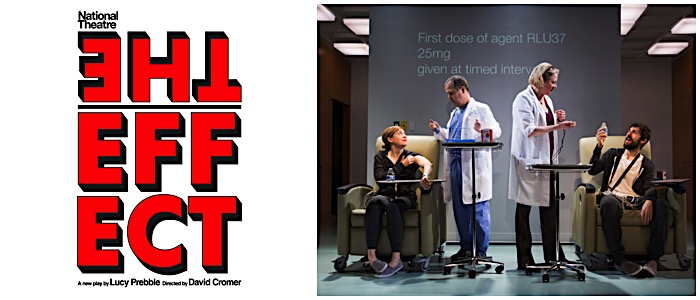
The Effect by Lucy Prebble (off-Broadway)
Here’s an original ‘meet cute’ — Connie and Tristan are paid volunteers at a month-long clinical drug trial testing out the effectiveness of a new antidepressant. They are isolated at the clinic for the entirety of their stay so that doctors can monitor effects (both physical and psychological) of the drug in a controlled setting. For example, they are not allowed to have cell phones or cigarettes, two rules Tristan blatantly defies. He immediately takes an interest in Connie, but their increasing flirtation makes her feel uneasy: how much of their connection is due to the dopamine effect of the antidepressant? Another layer of complication: the lead doctor overseeing this trial shares a past with the psychiatrist representing the drug in question, and ultimately her biases are called into question. I very much enjoyed this play, though the last quarter fell short in my estimation. This is a strong cast under director David Cromer’s steady hand.
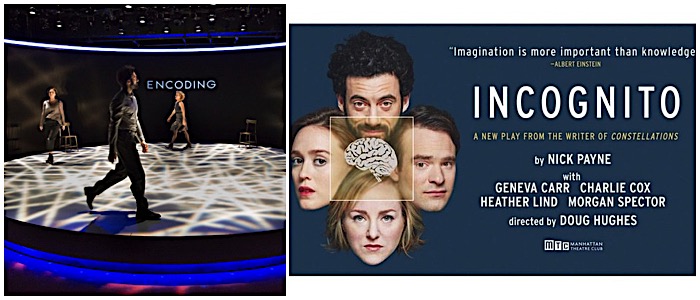
Incognito by Nick Payne (off-Broadway)
Before seeing this play I was unaware of the story / controversy about how Einstein’s brain went missing after his autopsy (good article for more info: The Strange Afterlife of Einstein’s Brain). U.K. playwright Nick Payne is perhaps best known stateside for last season’s Constellations, which featured the unlikely pairing of quantum physics and romance; in Incognito, he takes on another aspect of the science field — in fact, this play received support from the Alfred P. Sloan Foundation. Payne takes some dramatic liberties as we see four actors play multiple roles in various threads of story that, by the show’s conclusion, weave together to tell the larger picture of what MAY have happened to Einstein’s brain. But more compelling than that mystery is how Payne questions the purely physiological functions of the brain, weighing them against the emotional — is it possible to maintain a ‘sense of self’ when one is going through dementia, even though on a physiological level the brain doesn’t have a headquarters to retain that information? Payne answers that question in a moving way by the play’s conclusion, which left the elderly gentleman next to me sobbing.





